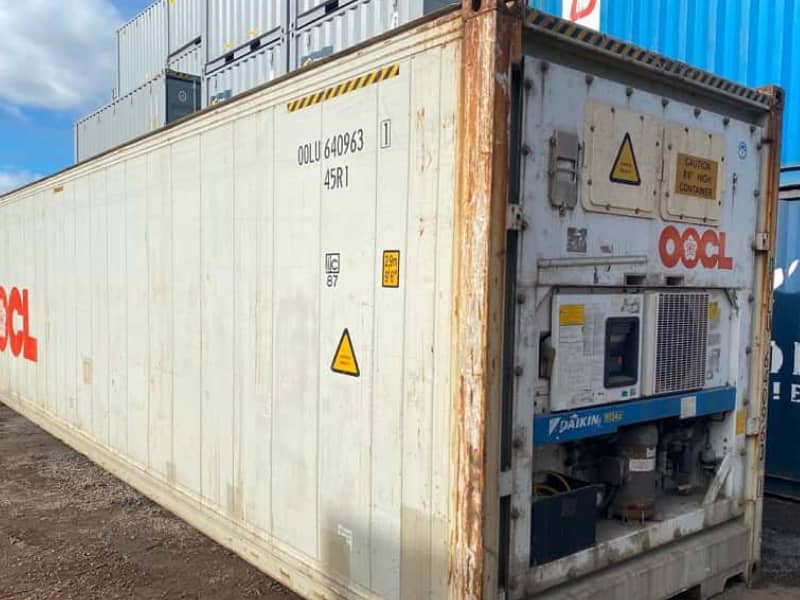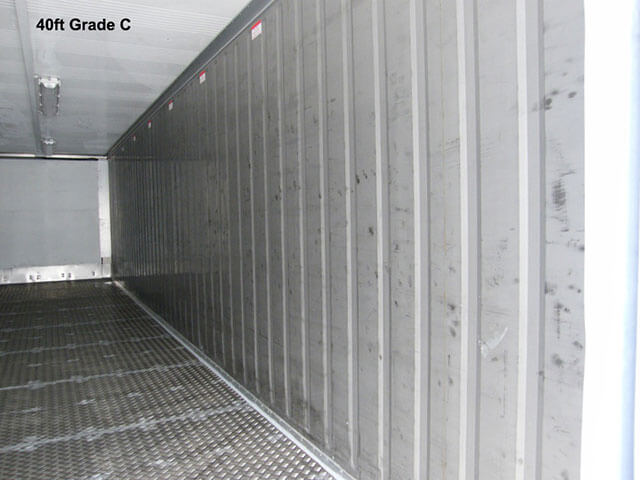All Concerning Cold Storage Containers: Crucial Insights for Your Storage Space Needs
Freezer containers play a vital duty in the preservation of perishable items. They are available in different kinds, consisting of chilled and shielded systems, each created for details storage demands. Understanding the benefits and essential features of these containers is necessary for businesses aiming to optimize their operations. As the need for reliable storage services expands, exploring the different alternatives readily available can result in notified decisions that impact both productivity and sustainability. What aspects should one consider when choosing the ideal container?
Kinds of Cold Storage Space Containers
Cold storage containers come in numerous kinds, each developed to meet details temperature control demands. Amongst the most usual kinds are refrigerated containers, which preserve temperature levels in between 0 ° C to 10 ° C, making them appropriate for disposable goods like fruits, veggies, and milk products. One more kind is the deep freezer container, which operates at temperatures below -18 ° C, perfect for lasting storage space of frozen products such as meats and seafood.
Insulated containers offer temperature security without active cooling, making them beneficial for short-term transport of temperature-sensitive items. Additionally, there are portable freezer systems, which supply flexibility in places and are commonly made use of in events or seasonal procedures. Ultimately, blast refrigerators rapidly lower the temperature level of hot foods, ensuring security and high quality. Each kind offers an one-of-a-kind function in numerous markets, from food service to drugs, stressing the value of choosing the ideal container for certain storage space requirements.

Benefits of Utilizing Cold Store Solutions

Cold storage solutions expand the rack life of things, minimizing waste and enhancing productivity for services. By successfully taking care of supply with appropriate temperature level control, firms can maximize their supply chains and enhance operational effectiveness.
In addition, cold store centers enable flexible storage choices, suiting various quantity requirements and seasonal variations sought after (used 40ft refrigerated shipping containers). This adaptability aids companies respond swiftly to market adjustments
Finally, using cool storage solutions can guarantee conformity with health and wellness regulations, guarding both services and customers. In general, the calculated use freezer enhances product administration while advertising sustainability and financial feasibility.
Trick Functions to Seek in Cold Storage Containers
When selecting cold store containers, numerous essential features merit careful factor to consider to secure peak performance and dependability. Temperature level control abilities are crucial; containers need to keep constant temperatures ideal for certain products. Insulation high quality additionally plays a substantial function, as premium insulation reduces energy intake and improves temperature level security.
Next off, simplicity of gain access to and loading is crucial; containers should provide straightforward layouts for effective handling and company. Sturdiness is one more crucial aspect; weather-resistant materials ensure durability and protect materials against ecological factors.
Furthermore, mobility attributes, such as built-in wheels or lifting factors, facilitate transportation, while customizable layouts permit tailored storage space options.
Monitoring systems, including temperature alarms and remote monitoring, give real-time updates, making particular that problems remain optimal. By focusing on these functions, individuals can select cool storage space containers that fulfill their operational demands efficiently.
Choosing the Right Cold Store Container for Your Requirements
Selecting the ideal freezer container calls for a thoughtful analysis of details requirements and operational requirements. Variables such as the type of items being stored, temperature level of sensitivity, and volume should be prioritized. As an example, disposable food products might demand containers with rigorous temperature controls, while pharmaceuticals might need accurate conditions to preserve effectiveness.
In addition, prospective users must take into consideration the container's size and mobility. A larger device might be needed for mass storage, while smaller sized, mobile alternatives could be suitable for on-site or temporary requirements. Insulation quality and power performance are additionally crucial, as these will certainly influence functional costs and temperature security.
Lastly, conformity with industry guidelines and requirements is crucial, specifically in industries like food and health care. By carefully examining these aspects, customers can select a cold store container that efficiently meets their unique requirements and guarantees optimum storage problems.
Finest Practices for Keeping Cold Storage Conditions
Keeping suitable cold store conditions is crucial for protecting the high quality and safety of temperature-sensitive products. Regularly monitoring temperature level and humidity degrees is crucial; utilizing trustworthy electronic thermometers and hygrometers can supply exact readings. Furthermore, correct insulation of freezer containers assists decrease temperature variations and power loss.
Executing a first-in, first-out (FIFO) system assures that older supply is utilized before more recent stock, reducing waste (used 40ft refrigerated shipping containers). In addition, keeping an arranged layout within the storage space enables for far better airflow and reduces the danger of cross-contamination
Regular maintenance examine devices, such as compressors and seals, are essential to avoid malfunctions. Team training on ideal practices for filling and dumping items helps maintain temperature level stability. Keeping doors shut as much as possible restrictions warm exchange, ensuring that the cool storage space environment remains reliable and stable in maintaining valuable products.
Expense Considerations for Cold Storage Space Solutions
When assessing freezer services, it is important to take right into account the initial financial investment expenses along with ongoing operational expenditures. A comprehensive break down of these expenses can reveal considerable long-lasting savings possibility for organizations. Understanding these financial elements assists stakeholders make notified choices regarding their freezer needs.

Initial Financial Investment Expenses
The monetary landscape of cold store containers offers various initial financial investment prices that organizations should consider. These costs typically consist of the acquisition or rental cost of the containers, which can vary based on kind, insulation, and dimension top quality. In addition, expenditures connected to retrofitting existing structures to suit chilly storage space must be factored in, particularly if specialized devices is called for. Installation prices, consisting of electric work and refrigeration systems, additionally add to the general initial investment. Businesses should not ignore transport expenses for providing containers to their desired area. Potential modification choices, such as shelving or temperature level monitoring systems, can better impact the preliminary economic expense. Mindful budgeting for these elements is vital for successful freezer application.
Functional Expenditures Breakdown
Functional costs for freezer services incorporate several important expense considerations that companies must navigate. Key factors consist of power expenses, which can be significant as a result of the demand to preserve reduced temperature levels. Maintenance costs are also substantial, as regular servicing is important to assure tools operates successfully and stays certified with wellness and safety criteria. Additionally, labor costs may emerge from the demand for specialized personnel to check the storage space and handle setting. Insurance policy expenditures are another consideration, as firms must secure their financial investments against possible losses. Any kind of possible regulatory conformity expenses need to be factored in, as businesses may require to invest in systems that stick to food security and ecological policies. Understanding these costs is important for efficient budgeting.
Long-Term Savings Potential
Investing in cool storage services offers significant long-term savings potential, changing first expenses right into monetary performance over time. By decreasing putridity and waste, services can enhance their revenue margins significantly. Advanced insulation and energy-efficient systems lower utility expenses, which build up over the life-span of the equipment. Furthermore, cool storage containers often call for much less frequent maintenance contrasted to typical refrigeration methods, bring about reduced repair work expenditures. The capacity to store items for extended periods without compromising quality permits services to exploit on market fluctuations, enhancing earnings. Additionally, the scalability of freezer solutions makes it possible for firms to adjust to transforming needs without sustaining extreme here costs. Generally, these elements contribute to an engaging situation for chilly storage as an affordable investment approach.
Regularly Asked Questions
Just How Lengthy Can Food Be Stored in Cold Store Containers?
The period food can be stored in freezer containers varies by kind. Typically, subject to spoiling products last from days to weeks, while icy foods can stay safe for months, relying on appropriate temperature and storage conditions.
Are Cold Store Containers Energy-Efficient?
The power effectiveness of freezer containers varies based upon layout and insulation high quality. Modern devices often use sophisticated technology to decrease power intake, eventually adding to reduced operational costs and environmental influence in lasting use.
Can Freezer Containers Be Custom-made for Details Needs?
Cold storage containers can certainly be customized to fulfill details needs. Adjustments may consist of temperature level controls, size modifications, and additional functions, permitting individuals to tailor solutions efficiently for various storage space needs and operational preferences.
What Are the Usual Sizes of Cold Store Containers?
Cold storage space containers usually can be found in basic sizes such as 10, 20, and 40 feet. These measurements fit various storage space requirements, making sure adaptability for businesses needing temperature-controlled settings for perishable items or delicate materials.
Do Cold Storage Containers Require Special Permits for Usage?
Cold store containers typically require unique permits for usage, depending upon neighborhood regulations and intended applications. Authorities might mandate authorizations to ensure security requirements, environmental compliance, and proper functional methods are preserved throughout their application.
Cold storage space containers come in different kinds, each created to fulfill particular temperature control requirements. In addition, chilly storage centers permit for flexible storage options, accommodating numerous volume requirements and seasonal fluctuations in demand. Selecting the right cool storage space container needs a thoughtful evaluation of specific requirements and functional requirements. The financial landscape of cold storage space containers offers different preliminary financial investment expenses that organizations have to think about. Cold storage space containers can undoubtedly be tailored to satisfy specific requirements.